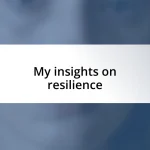Key takeaways:
- Change is a journey that involves overcoming fear and embracing new opportunities for growth.
- Identifying personal resistance to change is crucial; it often stems from discomfort, denial, and habitual patterns.
- Setting realistic goals through manageable steps and celebrating small victories fosters a rewarding change process.
- Embracing and celebrating transformation reinforces self-affirmation and gratitude for personal growth and achievements.
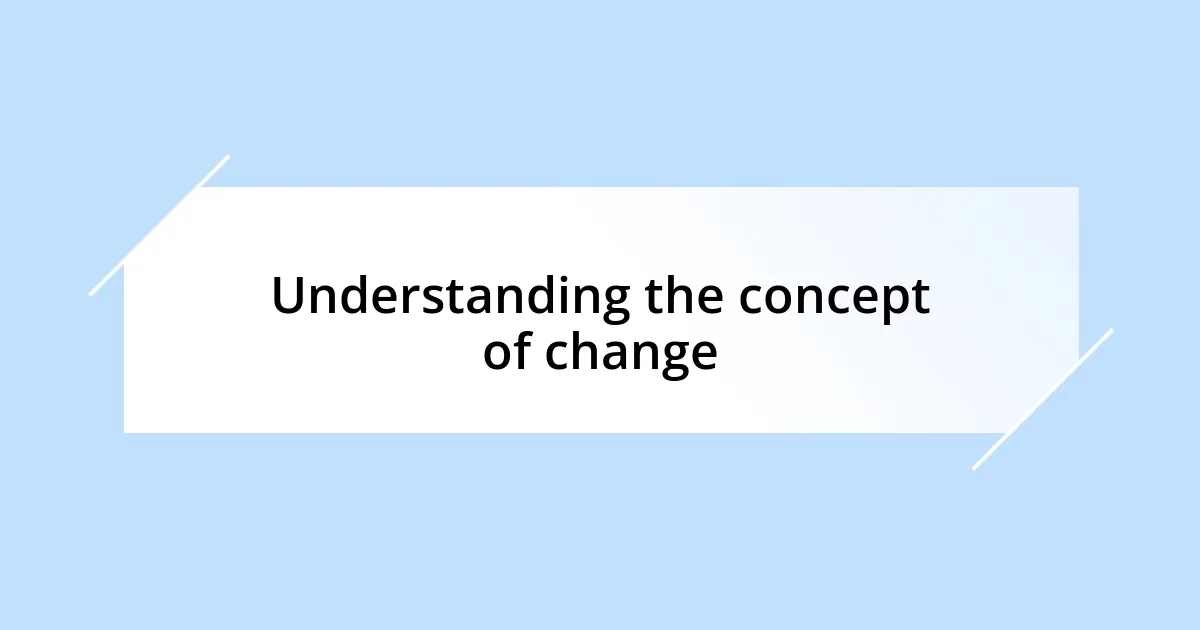
Understanding the concept of change
Change is an inevitable part of life, yet many of us resist it out of fear or uncertainty. I remember a time when I was about to switch careers; the thought filled me with anxiety. What if I wasn’t good enough? That moment taught me that understanding change starts with acknowledging our fears and recognizing that each shift opens up new opportunities.
When I reflect on my own experiences, I realize that change isn’t just an event; it’s a journey that unfolds over time. I found that embracing small, everyday changes—like altering my morning routine—helped me build resilience. How often do we overlook the growth that happens in our daily lives? Recognizing these incremental changes can make the larger transformations feel less daunting.
In essence, understanding change is about shifting our perspective from seeing it as a threat to viewing it as a chance for growth. I can vividly recall a phase where I questioned everything around me, from my job to my relationships. That questioning became a catalyst for reflection and eventually led to positive changes I hadn’t anticipated. Can you think of a moment when uncertainty pushed you toward something better? That’s the power of change—it can lead to profound personal evolution if we allow ourselves to lean into the discomfort.
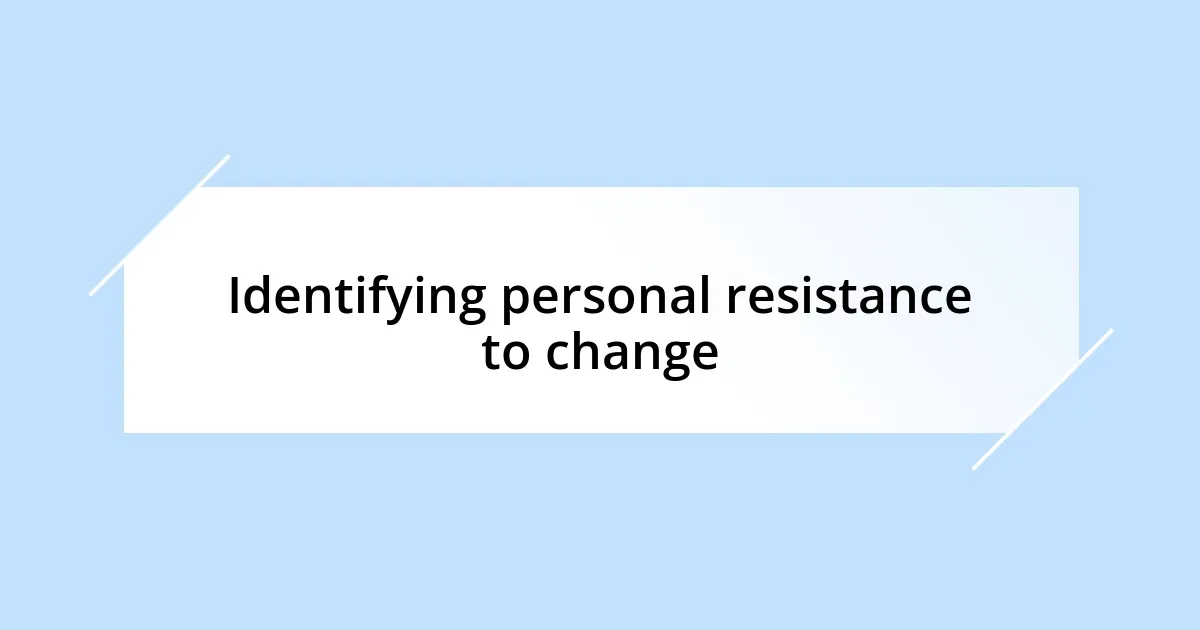
Identifying personal resistance to change
Identifying personal resistance to change often starts with recognizing the internal cues that signal discomfort. I recall a time when I hesitated to adopt a healthier lifestyle. Every time I thought about giving up my favorite snacks, a wave of resistance surged within me. It wasn’t just about the food; it was the fear of losing comfort and routine. I soon realized that pinpointing these feelings was the first step to understanding my resistance.
Sometimes, my resistance manifested itself as outright denial. There was a period when I avoided addressing my financial situation. I would postpone budgeting in favor of impulsive spending, convincing myself that I could deal with it later. This pattern of avoidance only led to deeper anxiety. By acknowledging this denial, I could confront the underlying fears that propelled it. Have you ever noticed how denial can create an illusion of safety, even when it leads to more turmoil?
Ultimately, the key to identifying resistance lies in self-reflection and being honest with oneself. Reflecting on my career transitions, I’ve noticed habitual patterns where I’d cling to the familiar instead of exploring new opportunities. Each time I recognized this pattern, I found courage to step forward, reminding myself that the initial discomfort could lead to discovery and growth. What if we leaned into those moments of discomfort instead of shying away?
| Type of Resistance | Personal Example |
|---|---|
| Fear of Losing Comfort | Hesitating to change my diet, feeling anxious about missing favorite snacks. |
| Denial | Postponing financial planning due to fear of confronting reality. |
| Habitual Patterns | Clinging to familiar job roles despite yearning for growth opportunities. |
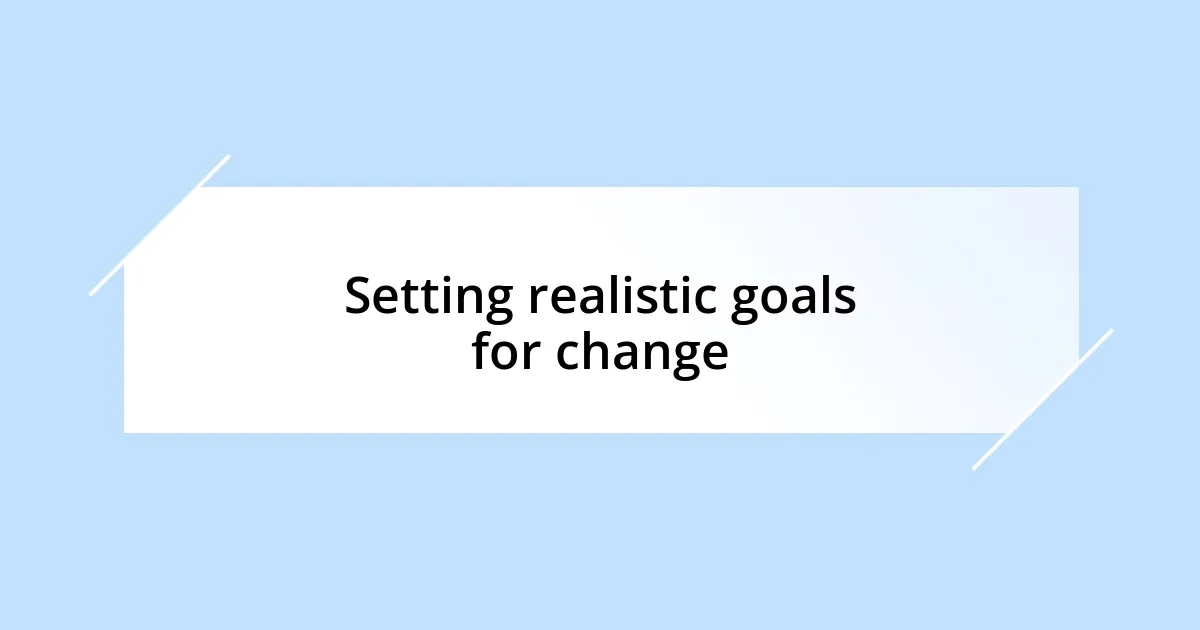
Setting realistic goals for change
It’s crucial to set realistic goals when navigating change, as this not only provides direction but also fosters a sense of accomplishment. I remember when I decided to overhaul my work-life balance; rather than aiming for perfection overnight, I focused on small, manageable adjustments. This approach made the transition feel less overwhelming and helped me recognize progress along the way.
To help you set realistic goals, here are some practical steps to consider:
- Break it Down: Divide larger goals into smaller, actionable steps. For instance, if you aim to learn a new skill, commit to spending just 15 minutes a day on it.
- Be Specific: Clearly define what success looks like. Instead of saying, “I want to be healthier,” try, “I will walk for 30 minutes three times a week.”
- Stay Flexible: Life can throw curveballs, so be prepared to adjust your goals as needed. There were moments when I realized my initial goals were too ambitious, and that’s okay!
- Celebrate Small Wins: Acknowledge your achievements, no matter how minor they may seem. Each small victory bolstered my confidence as I pursued my broader objectives.
With these strategies, I found that my journey through change became not just manageable but also rewarding. Embracing the process of setting realistic goals has enriched my experience and allowed me to savor the little victories along the way.
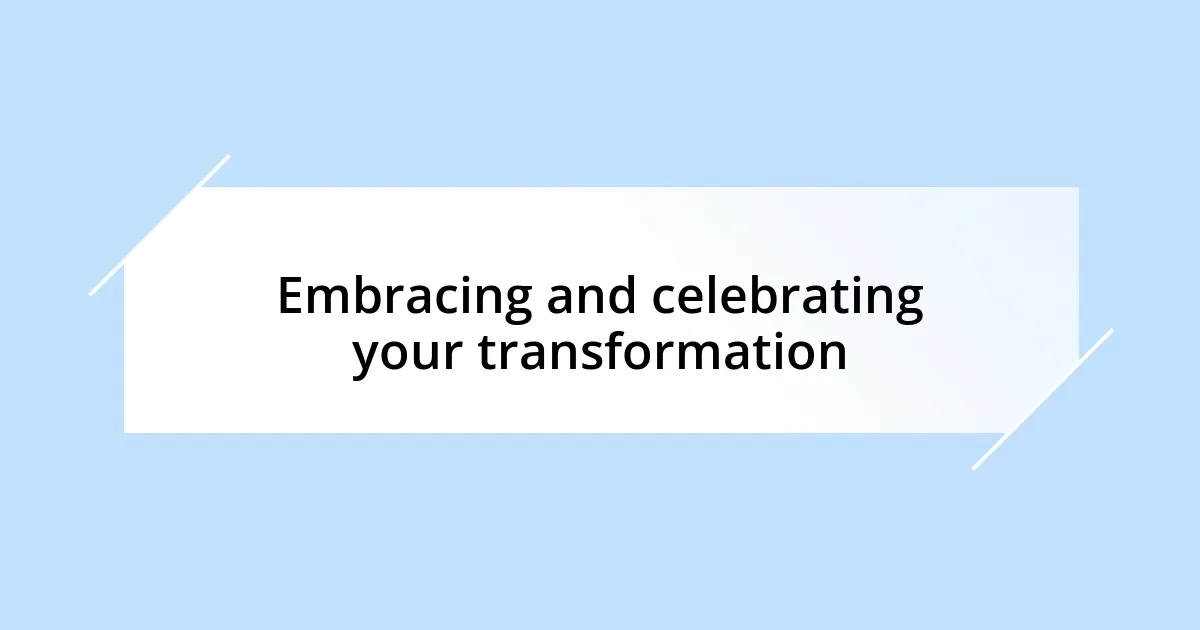
Embracing and celebrating your transformation
Embracing and celebrating your transformation isn’t just about acknowledging change; it’s about reveling in the journey it takes to get there. I recall a pivotal moment when I landed a new job after months of searching. Rather than just feeling relieved, I hosted a small gathering to celebrate with close friends. It felt grounding to share my achievements, and that moment reinforced the idea that transformation is worthy of recognition, no matter how big or small. Have you ever found joy in celebrating progress with others?
As I navigated my personal growth, I discovered the power of self-affirmation. I often found myself jotting down a list of milestones—like completing a challenging project at work or stepping out of my comfort zone by attending social events solo. Even the smallest victories, such as learning to say “no” to things that didn’t serve my well-being, were worthy of celebration. Each of these moments served as a reminder that transformation is built on a series of incremental successes. Isn’t it amazing how much our self-perception can shift when we take a moment to celebrate ourselves?
Sometimes, reflecting back on my transformation elicits a wave of gratitude. I visualize the person I was before embracing change—the anxieties, the hesitations. It’s hard not to feel a sense of pride when I think about how far I’ve come. Embracing change has opened doors I never imagined possible, and each milestone along the way deserves to be celebrated. What transformation in your life evokes a similar pride?











